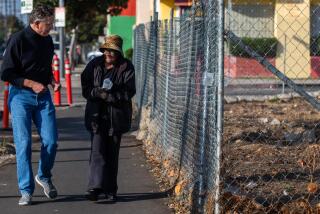Economic Windfall Seen in Purchase of Ex-Army Base : Development: The 14-acre parcel holds potential for development and the resulting boost in city tax revenues.
- Share via
BELL — Just east of the Long Beach Freeway, tucked behind dozens of warehouses, lies a weed-filled lot that city leaders say could give this tax-starved city a boost in the 1990s.
Last week, after nearly four years of haggling with the federal government, jubilant city leaders entered into an agreement to buy the 14-acre parcel that was once part of the Cheli Army air supply base.
The city will issue bonds totaling $8.9 million to buy the property, which veteran Councilman Jay Price called “one of the most valuable pieces of land in the entire county.” The parcel is near Bandini Boulevard and Atlantic Avenue.
Price, who has been on the council for about 33 years, helped lead the successful drive to annex the Cheli base in 1960.
“People said ‘you’re crazy (to annex the land),’ ” he recalled. “We said, ‘Let time take its course and you’ll find out if it’s foolish.’ And, of course, it was not.”
City officials said they will hire a consultant to determine the best use for the land but, according to the agreement with the federal government, the city cannot sell the property to a private developer for another three years. However, the city can lease the land or enter a joint partnership agreement with a developer.
At this point, city leaders said they are not sure what they will do with the land, but the main thing, said Councilman Ray Johnson, is to “start bringing tax revenue into the city.”
Bell, like many other cities, is desperate for tax revenue, but the tiny city has little land left to develop. For that reason, the 14-acre parcel represents a golden opportunity for Bell, city officials said.
At one time the Army Air Corps base was spread out over 450 acres. During World War II, soldiers inventoried tons of military supplies there.
Over the years, the General Services Administration, which conducts federal land transactions, has sold pieces of the property to public and private interests. The U.S. Postal Service and Trammell Crow Co. own the largest pieces. What remains is about 100 acres of ramshackle barracks and aging warehouses now used by several government agencies to store supplies.
In 1988, a consultant predicted that the remaining land could be transformed into a regional shopping center that could generate sales of about $2.3 billion a year. But to city officials’ frustration, the GSA has kept a tight grip on the land.
So when the GSA declared the 14-acre parcel surplus property five years ago, the city rushed to the negotiating table to buy it.
There are problems with the site, however. It is too small to build the regional commercial center once envisioned by city leaders, and, although the land is clearly visibly from the Long Beach Freeway, there is no way to get to it. City officials will have to build a road from Bandini Boulevard, just south of Atlantic Avenue, to provide access to the property.
In the meantime, the city will begin lobbying to buy more land from the agency.
“Our real goal is to get a bigger piece, but the government keeps insisting on releasing parcels in piecemeal fashion,” Councilman George Cole said.
Cole said that the GSA is now re-evaluating its storage needs at the base. He said the city has offered to build new, more compact warehouses on the base, thus freeing up more land for the city to buy.
More to Read
Sign up for Essential California
The most important California stories and recommendations in your inbox every morning.
You may occasionally receive promotional content from the Los Angeles Times.













